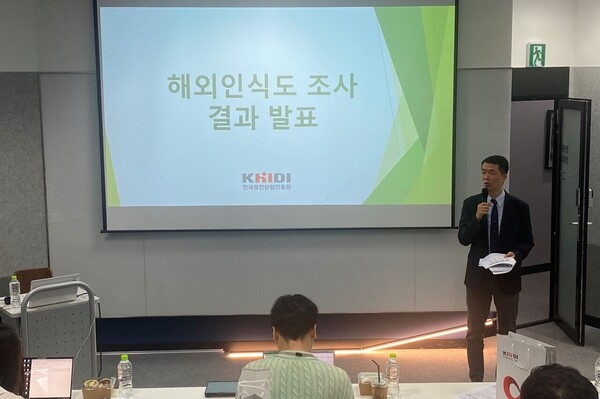
A new survey shows that awareness of Korean bio and health products continues to rise overseas.
On Wednesday, the Korea Health Industry Development Institute (KHIDI) announced the results of the 2022 Overseas Perception Survey of the Korean Bio-health Industry (manufacturing and medical services).
It was the second survey following the first one in 2021, which covered only bio-health products, such as pharmaceuticals, medical devices, and cosmetics. This time around, however, the survey expanded its targets to include healthcare services.
KHIDI conducted the survey from Oct. 27, 2022, to Nov. 22, on 9,120 general consumers and 365 medical and industrial professionals in 19 countries, including the United States, China, Japan, India, and Germany, to which Korea exports many bio-health products.
The surveyor asked about the awareness of and preference for Korean bio-health products and services, willingness to purchase and recommend Korean products and healthcare services, and contents related to Korea's likability and competitiveness in these countries.
According to the survey, overseas awareness of Korean bio-health products, such as Korean medicines and medical devices, increased last year compared to 2021, especially in developed countries, including Japan, Australia, and Europe.
Awareness of Korea as a manufacturer of bio-health products was 75.1 percent, up 3.5 percentage points from 71.6 percent the previous year. In the pharmaceuticals sector, awareness increased by 4.8 percentage points year-on-year, rising more notably in Japan, Australia, and France.
Asked about Korean healthcare services awareness for the first time, 61.3 percent of respondents said they were aware of it. Awareness was high in countries that send many patients to Korea, such as Vietnam, China, and Mongolia.
Korean healthcare service’s national brand power and recognition have noticeably strengthened since Covid-19, especially in countries like Vietnam, Indonesia, UAE, and Saudi Arabia.
The analysis of the relative perception gap between Korean bio-health products and healthcare services, Vietnam, China, Thailand, and Indonesia showed a higher perception of both manufacturing and healthcare services, while Kazakhstan, UAE, and Russia had a higher perception of Korean healthcare services than manufactured products.
According to the analysis of the correlation between the arrival of foreign patients and the awareness of Korean healthcare services in their countries, the awareness of Korean medical services was relatively high in countries that sent more patients to Korea.
For example, China, which sent the largest number of patients to Korea, showed high awareness of 83.3 percent, followed by Mongolia (the fifth-largest number of patients and 80.8 percent) and Vietnam (seventh largest and 91.7 percent).
Some Middle East countries also showed high awareness of Korean medical services despite the relatively smaller number of patients visiting Korea, such as the UAE (10th and 74.2 percent) and Saudi Arabia (14th and 71.7 percent).
"The significance of the recent survey is that it included not only bio-health products but medical services, such as the attraction of foreign patients,” said Han Dong-woo, head of the Health Industry Innovation Planning Team. “It will likely prove highly useful for the Korean bio-health industry to establish customized overseas expansion strategies for each country."

